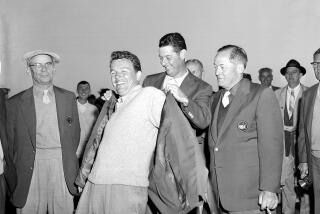Here’s how Augusta National could make an eloquent statement
- Share via
AUGUSTA, Ga. — Oh, how badly I wanted to walk and see and smell and write about whatever it is that makes the Masters masterful.
For we first-timers, on this first day of the tournament, it is almost mandatory. Craft an entire column that attempts to explain how there are golf tournaments, there is the Masters and never the twain shall meet.
Sportswriting allows so few similar opportunities. Where else can you tell readers about a place that is color-coordinated in the greens of grass, the whites of sand and the blues of sky; where putting greens are more like green-carpeted gymnasium floors, after the water pipes below them have burst?
Where else can you chronicle a vast expanse of rolling land that looks the way you’d imagine a Civil War battlefield site; a place where the chirping birds stop in golfers’ backswings? Where gentle breezes kick up on humid days as if they were on air-conditioner timers and simultaneously, you feel the sweat form and the breeze kick up?
John Feinstein once wrote a book about the pressures and difficulties of the pro golf tour. He titled it “A Good Walk Spoiled.” He meant everywhere but at the Masters.
But rolling hills and gentle breezes must take a back seat today to one of the more fascinating juxtapositions of issue and solution that we have ever witnessed. It all happened here Wednesday, and it has taken a day to digest and fully comprehend its wonderful timing.
Wednesday morning, the chairman of Augusta National Golf Club, Billy Payne, met the press for his annual state of the union talk. Payne and the Masters brotherhood — note the gender of that word — like the briefing to stay within the boundaries of putting surfaces and trees that have been trimmed. This year, the boundaries were crossed.
Augusta National has no female members. It doesn’t have a written rule against it, and during the year many women play the course as guests. Still, the active, but not official, ban on women is an issue that stirs the pot of exclusion. Augusta National says it is a private club and as such, can admit whomever it wants. Critics say that doesn’t work when the same club is hosting the most public of events and benefiting from that financially and intangibly.
The issue stirred previously in 2003, when women’s activist Martha Burk challenged Augusta National to be inclusive. Payne’s predecessor, Hootie Johnson, responded that he would not be brought to a decision “at the end of a bayonet.” The tournament ended and the issue went away.
It returned Wednesday, when reporters pressed Payne on whether Augusta National would admit the new chief executive of IBM, Virginia Rometty. IBM is a top sponsor of the Masters. In the past, IBM CEOs have been members. In the past, they have been men.
Payne’s response was that this was the private domain of the members and he wouldn’t violate that privacy. He was asked the question half a dozen ways: How would you explain this to your granddaughter, etc. He didn’t budge, thereby fanning the flames.
We flash forward about seven hours to the annual Golf Writers Assn. of America banquet. It is a night of awards, attended by about 400. One of the awards is named for Ben Hogan and honors somebody in golf who has overcome injury or illness to succeed.
Sophie Gustafson of Sweden came forward. She is 38, three-time player of the year on the European women’s tour, with a total of five LPGA titles and 26 total pro titles. In September in the Solheim Cup, which matches Europe against the United States, she led Europe to victory with a 4-0 record.
It was announced that, instead of giving an acceptance speech, she had made a tape. If you didn’t know what was coming, you were jolted out of your chair.
Gustafson stutters. Badly. Each sentence finds its way to a bumpy stop. She spent her career avoiding interviews, even folding near the end of tournaments when she was in contention, some say, so she wouldn’t have to make an acceptance speech.
When she won the LPGA Chick-fil-A event in 2000, she stepped to the microphone, said “Thank you,” and then handed a speech she had written just in case to tour mother figure Nancy Lopez, who read it.
They ran the film, one that she did with her own camera, alone in a room. It ran 61/2 minutes. According to the New York Times, it took her eight hours to make.
It was like nothing you’ve ever seen before.
It was gut-wrenching and uplifting, depressing and inspirational. If you didn’t get chills, you weren’t alive. The player who stands over the final putt on the 18th hole of the Masters on Sunday, no matter what the result, cannot exhibit the amount of guts Gustafson did in this film.
Her “Thank you” was sprinkled with conviction and humor — try doing one-liners when you stutter. She said children who stutter should aim to do anything they want, “but I would advise against phone sales.”
She is strong, stubborn. Ron Sirak wrote recently in Golf Digest about having dinner with her in an Indian restaurant. She ordered papadum. Sirak says you are not to help, no pointing at the menu. The waiter waits and waits — she demands that and she gets it out.
When her film ended, the standing ovation was spontaneous. There were several more special speeches, but Gustafson had stolen the show. She would have stolen any show.
Which brings us back to Billy Payne. Had he been paying attention, a perfect solution to his problem was at hand.
Make Sophie Gustafson, a world-class player with a world-class story, the first female member of Augusta National.
More to Read
Go beyond the scoreboard
Get the latest on L.A.'s teams in the daily Sports Report newsletter.
You may occasionally receive promotional content from the Los Angeles Times.











